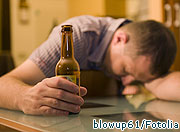Children who see their parents drunk are twice as likely to get drunk regularly themselves, a survey of young teenagers has concluded.
The Joseph Rowntree Foundation, a charity that conducts research into social issues and commissioned the survey, has reported that 70% of the 15 to 16-year-olds questioned had been drunk at least once.
And there is evidence that poor parental supervision raises the likelihood of teenage drinking.
Behaviour
Ipsos MORI surveyed 5,700 children aged 13 to 16 for the poll and discovered that 38% of the 13 to 14-year-olds questioned had been drunk at least once.
The survey found the behaviour of friends is a powerful factor in predicting drinking habits and the more time teenagers spend with friends, the more likely they are to drink alcohol, it suggested.
But the study also looked at what influences excessive teen drinking and the habits of parents seem to be particularly powerful.
Influential
Claire Turner, Programme Manager for the Joseph Rowntree Foundation, said: “This research shows that parents can have more influence on their teenagers’ behaviour than perhaps many assumed”.
“Both what parents say, and how they behave, have a strong impact on their teenagers’ drinking, drinking regularly, and drinking to excess”, she said, adding that “there are differences in patterns across the group.”
She concluded: “So for the older teenagers, if they are introduced to alcohol later in life via friends, away from adult supervision, they are also more likely to drink to excess.”
Standard behaviour?
Don Shenker, Chief Executive of Alcohol Concern, said: “Parents have to realise and accept that whether intended or not, their own attitudes towards drinking, their own rate of drinking and any drunkenness are clear signals to children that this is acceptable and standard behaviour.”
Mr Shenker also urged Government ministers to look at some of the reasons why obtaining alcohol is so easy for children.
He said the Government “should look to see if they’ve done everything they can to stop the large supermarkets from continuing to heavily promote cheap alcohol which incentivises more alcohol purchases and therefore results in more alcohol being stored in the home.”

